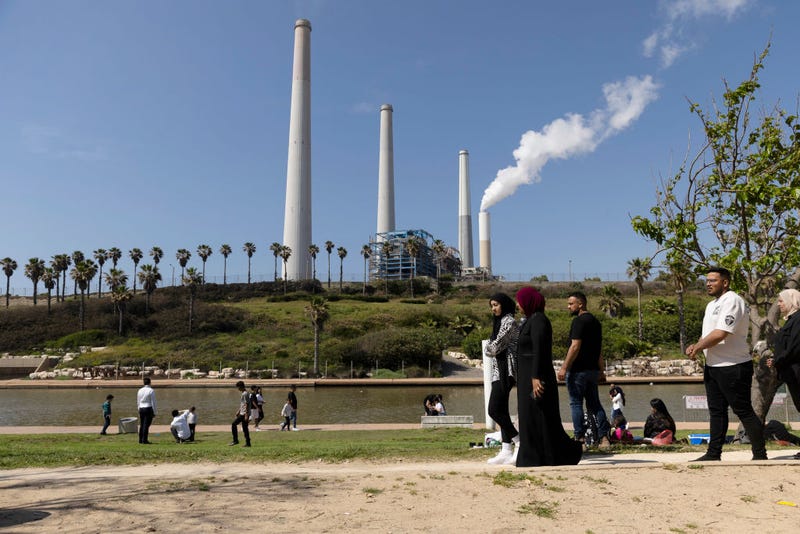
“Iran has begun an airborne attack against Israel,” said a Saturday announcement from the White House.
Since the Oct. 7 Hamas terrorist attack on Israel and the start of the Israel-Hamas war, the U.S. has been trying to avoid expansion of the war, and in particular Iranian involvement. What does this strike mean for the U.S., as Israel’s greatest ally?
According to a statement from National Safety Council Spokesperson Adrienne Watson, President Joe Biden is “being regularly updated on the situation by his national security team and will meet with them this afternoon at the White House.”
“President Biden has been clear: our support for Israel’s security is ironclad,” it said. “The United States will stand with the people of Israel and support their defense against these threats from Iran.”
His team is also in communication with Israeli officials. Iran’s attack on Israel is expected to unfold over a number of hours. A statement from Pentagon Press Secretary Maj. Gen. Pat Ryder said that Secretary of Defense Lloyd J. Austin III spoke with Israeli Minister of Defense Yoav Gallant Saturday “to discuss urgent regional threats and reiterated unwavering U.S. support for Israel’s defense.”
Austin said Israel could count on full U.S. support.
Tension between the U.S. and Iran – two of the nine countries on Earth that have nuclear weapons, per the Federation of American Scientists – has remained steady since the 1979 Iranian Revolution, according to the Council on Foreign Relations. This tension increased with the start of Israel’s war on Hamas, an Iran-backed terrorist organization.
Per the CFR, “tensions between the United States and Iran are at their highest in years despite both sides asserting that they do not want direct confrontation,” and proxy warfare alone put thousands of U.S. troops and U.S. interests in the Middle East “in significant danger.”
It said Iran-backed proxy forces have carried out over 150 attacks on U.S. targets in Iraq and Syria as of April 11. In response, the U.S.
ordered airstrikes on Iran-backed facilities last October and this February.
At the same time, the Israel-Hamas war has intensified near the Gaza strip, and Israel has been criticized by Biden for not protecting aid workers helping Palestinian civilians who are in danger and have limited access to humanitarian resources. Recent polling found that even Israelis are critical of Prime Minister Benjamin Netanyahu even though they support the war.
Hostage and ceasefire negotiations led by the U.S. were underway before the Iran attack, but were delayed as Hamas indicated it did not have enough living hostages for the proposed exchange.
This Wednesday, Iran’s Supreme Leader, Ayatollah Ali Khamenei, reiterated his previous promise on that he would retaliate against Israel over an attack at the Iranian consulate in Syria earlier this month that killed 12 people (including two top commanders from Iran) and leveled a building. Iran holds Israel responsible for the strike, but Israel has denied involvement.
Israeli Foreign Minister Israel Katz said his country would strike Iran directly if the Islamic Republic launched an attack from its territory against Israel.
Shortly after the Hamas attack on Israel in October that killed approximatley 1,100 people, Iranian Foreign Minister Hossein Amir-Abdollahian made an “ominous threat” to the U.S. He said an expanded war in the Middle East was “unavoidable.”
Audacy reported in January that “Iranian officials have warned that they will respond ‘decisively’ to any threat from the United States as the Pentagon prepares to respond to the drone attack that killed three US soldiers in Jordan.”
Last December, The Hill reported that a “war with Iran would be disastrous for the United States and the broader Middle East,” and that upwards of 120,000 troops would likely need to be sent to the Middle East based on war strategy.
As of 5:45 p.m. ET Saturday, Iran had launched more than 100 drones toward Israel, according to NBC News. Citing a U.S. official, the outlet said the Biden administration also expects Iran to launch “dozens of cruise missiles and dozens of ballistic missiles targeting Israeli government sites,” though not civilians or religious sites. Earlier in the day, “Iran’s Revolutionary Guards seized an Israeli-linked container ship in a helicopter operation near the Strait of Hormuz,“ said state news agency IRNA as cited by CNN.
“The US and Israel have coordinated on a defense plan, including the USS Carney and other destroyers and assets, officials said,” according to NBC News.
